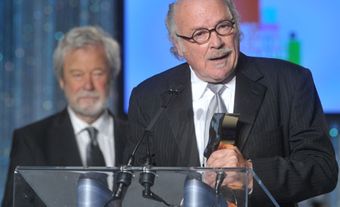This article was originally published in Maclean's Magazine on July 13, 1998
Celluloid Dreams in BC
The movie business has long attracted hopeful outsiders. Many have learned the hard way that Hollywood is a world apart - a risky business where the uninitiated are routinely shorn.
- Nancy Griffin and Kim Masters,
Hit and Run
Frank Giustra has been warned. Eighteen months after leaving the chairman's job at Toronto-based Yorkton Securities Inc. as a millionaire, the 40-year-old former broker is directing one of the most audacious business plays in the country. Lions Gate Entertainment Corp., barely two months past its first birthday, is already a Canadian giant, with its hand in television, live-action movies, animation and the biggest studio lot north of Los Angeles. But Giustra's ambitions reach all the way to that famous sign in the Hollywood Hills. To hear him tell it, he has just completed Act 1 of a script that will create "something truly unique by Canadian standards - the Canadian equivalent of a U.S. studio."
That in itself is enough to make Lions Gate the most-watched entertainment company in the country. But what really raised eyebrows in the investment community was Giustra's decision to enlist the help of one of the men who inspired Griffin and Masters to pen their merciless 1996 account of tinseltown excess - Peter Guber. (The book is subtitled: How Jon Peters and Peter Guber Took Sony for a Ride in Hollywood.) Giustra's choice of the big-spending former chairman and CEO of Sony Studios as his partner in the high-stakes movie game has drawn so much attention - most of it negative - that it threatens to overshadow the rest of his strategy. "He is playing in the riskiest part of our business," observed the head of a rival Canadian production house, insisting on anonymity. "And if you're playing in an intelligent way, you don't go with the guy who just burned Sony for a billion dollars."
The man directing the action at Lions Gate is unfazed. "I read the book," Giustra says, leaning forward on a beige sofa in his office, his back to the twin peaks that give Vancouver's famous bridge, and his company, their name. He insists that Guber will not leave his company with bruised hopes and empty pockets, as he did Sony. For one thing, Giustra claims his contract with Guber gives the flamboyant producer no room to run up the kind of epic expenses he did at Sony. Besides, Giustra says Guber's performance is not a make-or-break proposition for Lions Gate. "That's not the business plan," says Giustra. "It never was."
The plan in question is just 18 months old. Giustra left Yorkton, a onetime boutique brokerage he had transformed from his Vancouver base into an international investment bank, at the end of 1996, promising himself a six-month sabbatical: "I had a million and one fantasies. Go lie on a beach, travel down the Amazon." But first, Giustra, who had dabbled for years as an investor in the movie business, commissioned some research on the Canadian entertainment sector. The research came in and his beach fantasies were history. By February, 1997, Giustra had sketched the outline of a company that would operate across the spectrum of visual entertainment, from Saturday-morning cartoons and small art films, to prime-time dramas and big-budget features. And one other thing: the company would owe nothing to cultural policy, choosing its projects solely on market appeal, not for how well they reflect Canadian values in order to qualify for government subsidies.
Size was the key. "You can't approach this business on a one-off basis," Giustra reasoned. "To succeed, you need the wherewithal to do a program of pictures over a long period of time." Giustra scanned the lists of Canadian movie and television-makers, animation houses and service providers, and concluded he could assemble from acquisitions a company able to produce material for North American and world audiences. "I knew I could raise the money," Giustra laughs. "It's what I do. I knew I was capable of raising north of $100 million."
But he still needed a connection in Hollywood. Los Angeles is where the big deals get made for North American movies, where the world comes to buy the rights to North American television series. Within weeks, Giustra was pitching his project to the former Sony chairman.
Griffin and Masters paint a harsh portrait of Guber, on whose watch Sony lost billions. His talent for matching scripts to actors and producers was offset by an epic appetite for lavish perks and payouts. On one occasion, to foster bonding among key studio executives, Guber took them rafting in the Grand Canyon - laying on an extra boat for dinnerware, a chef and a masseuse. "In an industry where avarice is not uncommon," the authors observe, "Guber and Peters distinguished themselves for greed."
After several meetings, Giustra reached his own conclusion about Guber. "Nobody is as good as he is at picking material and packaging it," says Giustra, citing Guber's many credits, including the mega-hits Batman, Flashdance and The Color Purple. "It's uncanny, and it's consistent over the years. If he only does what he did before, that sort of batting average is going to be fine."
While negotiations continued with Guber, Giustra began putting the rest of his plan into action. True to his resolve, he raised $120 million in two private share placements underwritten by a syndicate led by his former colleagues at Yorkton. Then he began buying:
- Cinepix Film Properties of Montreal, Canada's second-largest movie distributor after Alliance, in June, 1997, for 7.2 million Lions Gate shares, representing 15 per cent of the company's equity.
- North Shore Studios, Canada's biggest studio complex, a 14-acre lot in North Vancouver, in July, for $26.1 million and the assumption of a $10-million mortgage.
- Mandalay Television, a Los Angeles-based arm of the production company created for Guber as part of his departure from Sony, last September, for $1.8 million in cash and yet more shares.
Finally, in a manoeuvre straight from Giustra's early days on the Vancouver exchange, he launched a reverse takeover of a mining company, Beringer Gold Corp., which, with a name change, gave Lions Gate a listing on the Toronto Stock Exchange. Lions Gate began trading last November at $4.05 a share, closing last week at $2.65. Giustra says its fall does not worry him much. "Once all the pieces are in place," he says, "the share price will take care of itself."
More pieces fell into place in March. At the same time as Giustra revealed some of the details of his deal with Guber, Lions Gate announced an agreement with Paramount to make as many as 20 feature films over the next five years, worth $1.2 billion. The two deals hinge on a new entity named Mandalay Pictures, jointly owned by Guber and two associates, and Lions Gate. Paramount and a group of international distributors will put up 90 per cent of the financing, and Lions Gate 10 per cent, for Mandalay to make an average of four movies a year. Paramount will distribute the films; Mandalay will keep title to them. At the end of the five-year term, Lions Gate has the right to buy out Guber and his partners' interest in the subsidiary for Lions Gate stock. Says Giustra: "For Guber to make any money, we have to be profitable."
Despite the big dollars attached, neither announcement lit much of a fire under Giustra's stock. "Lions Gate is basically a feature film play," says David McFadgen of the Montreal brokerage Griffiths McBurney. "And feature films are volatile. There's a risk that in any one year, you have a lot of bad films."
One person who thinks Giustra has swung a good deal with Guber is Maclean's columnist Peter C. Newman, who joined the Lions Gate board of directors in February. Says Newman: "Frank has Guber hog-tied." Yorkton analyst Roger Dent, meanwhile, notes that Giustra's big-screen deal with Guber "is a key feature, but by no means the only story," for the company.
By far the bulk of Lions Gates' assets, Dent notes, are outside its relationship with Guber - and profitable. Lions Gate Films, the former Cinepix, makes a dozen features a year in the under-$15 million price range, modest by Hollywood standards. Buffalo 66, one of two Lions Gate films screened at Colorado's Sundance film festival earlier this year, opened last week. In May, wholly-owned Mandalay Television announced orders for four network series. Lions Gate expects to turn a profit on revenues of $140 million in its first year, before Guber's unit has made a single film.
That, the former stockbroker says, is the model he started with, the one based on how the U.S. studios operate. "It takes one film to break out," Giustra says. "And that provides the big payday. In the meantime, we make a very good profit." Maybe so. But in betting his hopes for that payday on Guber, there is no doubt that Giustra has put himself in the hands of one of the wiliest operators in Hollywood.
Maclean's July 13, 1998

 Share on Facebook
Share on Facebook Share on X
Share on X Share by Email
Share by Email Share on Google Classroom
Share on Google Classroom


